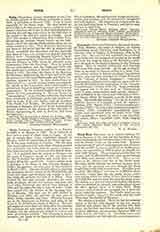

Costa, LORENZO, Ferrarese painter, b. at Ferrara in 1460; d. at Mantua in 1535. He is believed to have been a pupil of either Tura or Cossa. At the age of twenty-three Costa established himself at Bologna, under the patronage of the Bentivogli family, in the same workshop as Francia. The two men were much influenced by each other; Francia worked as a goldsmith, but Costa had the greater imagination, wider knowledge, and more perfect skill in drawing. It is probable that his coming to Bologna was the cause of Francia‘s change of craft, and that but for this friendship the greater man would have remained all his life a goldsmith. Costa’s earliest work in Bologna is the fresco in San Giacomo Maggiore (1480); his greatest, the altar-piece in San Giovanni in Monti (1497). The two friends united in painting the altar-piece for the church of the Misericordia, the center and upper part of which still remain in Bologna, while the predella by Costa is at Milan. They worked for the same patrons, decorated the same walls of palace, church, and oratory, and both suffered when Bentivogli was driven from Bologna in 1509, and his palace became a heap of ruins. Costa then passed into the service of the Gonzaga family at Mantua. His work can be well studied in Bologna, but there are pictures by him also in Milan, Berlin, London, and Paris. His early frescoes are in the Schifanoia in Ferrara, and some of his latest in the Schalcheria Castle at Mantua. He himself engraved more than one plate after his pictures. His paintings are very much in the style of those by Francia, but the subjects are treated in a freer and more picturesque manner. The coloring is always energetic, the heads of the figures well modeled and full of expression, the architectural backgrounds rich, varied, and accurate, and the perspective thoughtful and well planned. The draperies in Costa’s work are far less hard than those in Francia‘s, and fall in easy and not in rigid folds.
GEORGE CHARLES WILLIAMSON

